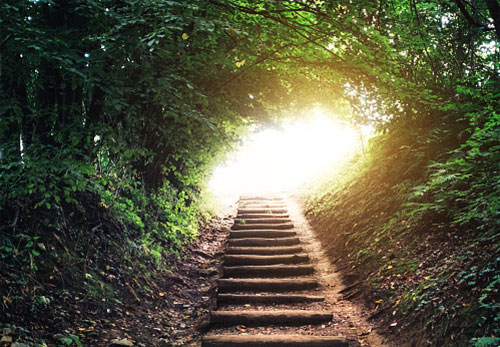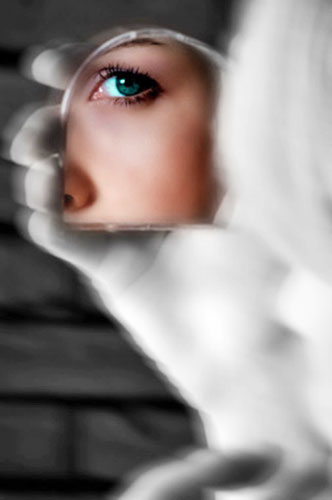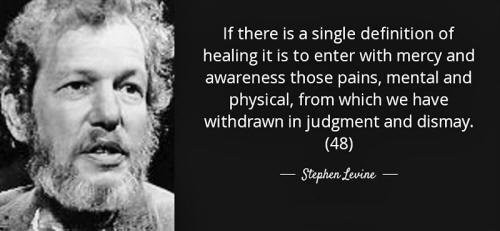|

by Richard West
12 August 2016
from
ComeBackToTheSource Website

Why die consciously?
Death - it comes to us all. We all know
this but how many of us have really explored our deaths? What I'm
about to say may shock you - but in many ways, those who get some
advanced warning of their deaths through terminal prognosis - they
are the lucky ones!
Of course many of you in this situation
will definitely not be feeling lucky and I completely understand.
A life shattered, knowing that it will
all come to an end so soon can be one of the hardest things for a
person to deal with. But let me explain why these people are lucky.
It's not because of the suffering they
may go through, but because of the tremendous opportunity they have.
Death as an
'opportunity'
Going through life we hit many small 'deaths' along the way. Loss of
loved ones, relationships and jobs, and more profoundly, loss of
health, abilities and identities.
Even if these things are only temporary,
they provide a great opportunity for
exploration of dying, in which we
will ultimately lose all of these things.
Many people expect that if they manipulate some outer circumstance,
for example dying at home surrounded by family and friends,
then they will have a beautiful death.
But if your life was one of holding on,
to things, people, or roles such as being a parent, then death will
magnify this tenfold.
Even if your life was one of giving and
caring, if this was motivated by a subtle need to boost your
self-esteem, if you clung to the notion of yourself as a 'caring'
person, then your death will also be a clinging.
What matters when dying consciously is
what is going on inside.
Then the outside world will reflect that
which is in you.

So, those who are in the position of knowing that their death is
coming soon, will be going through many stages as they process all
of what dying means for them.
It is these stages of the dying process
that provide us with the opportunity.
They are opportunities to look
at ourselves - all of our deeply unconscious fears will be
bubbling to the surface. We can use this as an opportunity to heal a
lifetimes worth of pain and suffering that we couldn't quite go
beyond before because it was buried too deep.
We can use them as an opportunity for
deep healing.
Death as
'healing'

Death presents us with the ultimate healing opportunity.
If we can look into the darkest aspects of our being with
compassion, and learn to let go of anything that is holding us back
or no longer serving us or those around us, then we will already be
coming 'back to the source' of our own being - from there dying is
simply like taking a well-trodden path to a new destination.
What are the
benefits of Dying Consciously?
Why go to all this hassle of digging down into all the muddy bits of
your being?
There are of course plenty of ways of
avoiding pain and suffering. Entertainment is enticing. It is a
method we have used our entire lives as society surrounds us with it
and pushes it on us.
Medications work wonders but many of
them do so at the price of consciousness - essentially they hold you
in a bubble of consciousness, numbing anything that gets pushed
outside the bubble, such reception to pain and emotions, but also
intuition, creativity and thought processing among other possible
things.

If your pain is looked at in a conscious way - that is non-avoiding,
compassionate, non-judgmental, but also with respect for where it
has come from - then you connect with parts of you that have been
distorted, healing them and becoming whole.
This also has a ripple effect into the
outside world and many relationships can be healed between loved
ones.
Some of the benefits of practicing Conscious Dying include:
-
Expanding through physical pain
- non-identification with the body
-
Flowing through each stage of
grief and of death with relative ease and coming out the
other side with a fresh perspective - non-identification
with emotions
-
Releasing attachments that hold
you back and embracing your source energy
-
Healing relationships with loved
ones through forgiveness and finishing business
-
An expansion of your being -
opening up into the unknown
-
Release of Karma which would
otherwise draw you back to similar circumstances in future
lives
Releasing
Karma
Karma is the word that describes
blockages that have built up over time.
They are blockages in the flow of your
soul attained through identification with the 3 lower planes of the,
-
physical
-
emotional
-
mental
As your soul is ever being drawn back to
the source (oneness) it will be looking to release this Karma.
In order to release Karma, you will draw
circumstances in your life through the law of attraction which will
cause you to confront those places in which you've become
identified.
The dying process will likely bring most if not all of these
identifications to light at some point. Conscious Dying helps you to
confront these blockages and transcend them, making the dying
process 'smoother'.
Of course if these blockages are not
confronted it's also OK. You will simply attract other circumstances
in other lives.
But why not use such an incredible
opportunity when it comes? For a brief period, dying magnifies all
of these attachments and makes them simpler (not necessarily easier)
to work with and let go of.
Releasing Karma will mean that your soul can move on to other
adventures after you pass on, instead of being drawn back to the
same circumstances.
It will put you ever more in harmony
with the flow of your soul and the rest of the universe.
A choice to
make
So, Conscious Dying is a choice.
It's a choice that only you can make. If
there are pitfalls along the way (as there likely will be) it's OK.
There are no hard and fast answers, but
you have all the time in the world:
-
Who says the work doesn't
continue after you've passed on?
-
But, why not seize that
opportunity while it's there?
-
Why not do what your soul is
yearning to do?
-
Why not begin today?
How to Die Consciously
September 2016
from
OshoSammasati Website

Why would you
want to die consciously, and how to go about preparing for that?
Here we look at the psychological and
spiritual aspects of dying with awareness.
Dying consciously will also include
attention to some practical aspects such as creating a will, Advance
Decision (also known as a Living Will) and so on. If a man can die
in the state of consciousness, for him death exists no more.
In other words, if a man can manage to
remain conscious at the time of death, he finds he never died at
all: death appears just a delusion to him. Death proving to be a
delusion does not mean, however, that death remains in some form as
a delusion.
Rather, when a person dies fully
conscious, he finds there is no death at all.
Then death becomes a falsehood.
[1]
Why die
consciously?
Let's start by asking:
Why live consciously?,
...because living-dying is one process
but it's easier to understand dying indirectly, through our everyday
living.
We can live on 'automatic pilot' - absent in a sense and just going
through the routine of our day. But when we are present - that is,
open to what is in each moment, fully engaged and observant - our
experience changes qualitatively.
The joyful, loving moments become deeper
and more vibrant. Even the otherwise-unremarkable events take on a
new significance.
Unaware, when times are challenging, we are overwhelmed by anxiety.
By contrast, when we face anxiety consciously we can watch the
worried thoughts and feelings without fighting them.
There's an acceptance that anxiety is
simply what is happening in the moment and - as do all other
emotions if we allow them to - will pass on.
We may notice too that challenging times provide their own
teachings. Through them we find out a little more about ourselves
and so they can be the catalyst for waking up a little more.
So: when we know that being fully present to whatever life presents
is the most fulfilling and meaningful way to live, we'll want to
live our dying in the same way.
We don't anticipate, when we become sick, that the soul will be
engaged. Yet a life-threatening illness calls to the soul, taps into
spiritual resources, and can be an initiation into the soul realm
for the patient and for anyone else who is touched by the mystery
that accompanies the possibility of death. [2]
Dying can do a similar job to meditation:
it, too, jolts us into the present.
The past is rapidly fading and there is
not going to be a future, or certainly not in a way that we can
imagine. Knowing for certain now that our life is going to end, we
are more aware of it than perhaps we have ever been.
Paradoxically (paradoxes line this
particular path!) when we are conscious to our dying, we become more
capable of really living.
How to help yourself
stay aware when you die?
-
At whatever stage you are in life, be as
aware as you can
If you know you are going to have to bail out of a plane,
it's smart to have a parachute with you (and one that you
know works) rather than to start making one just before you
step outside! In other words:
dying is a process that
happens not separately from living but as part of it.
So if we want to die consciously
we need to start living consciously.
Ordinarily, we look upon death as something that happens
outside of life, or as some kind of phenomenon opposite to
life. No, in fact, it is the final occurrence in the series
of events that take place in life.
It is like a tree that bears
fruit.
First the fruit is green, then
it starts turning yellow. It turns more and more yellow
until finally it becomes completely yellow and falls from
the tree.
That falling from the tree is
not an event outside of the yellowing process of the fruit;
rather, it is the eventual fulfillment of the yellowing
itself.
So the event of death is but a part of the chain of events
belonging to the same phenomenon. The final event is not the
end; it is just a separation.
One relationship, one order, is
replaced by another relationship, another order. [3]
You should be content - as
if you have reached your goal; as if there is no further
journey to be undertaken; as if there is nowhere else to
go.
No matter what may be
achieved, it should be more than enough. There should be
no thought whatsoever of achieving more than you already
have.
If this happens to you, how will you be born again? You
will die fully satisfied. And the man who dies
completely satisfied has no reason to come back again.
Such a man has known the art of death.
The man who dies in
desirelessness knows the art of death. [4]
… and complete 'unfinished
business'
Unlived experiences that we'd been hankering to have and
issues between ourselves and others that we have ignored,
remain hanging about us.
They can be a distraction and
cause us anguish when we are facing death.
'whenever death knocks on
the door it will find you ready. By going with death you
are not a loser. You may be moving into a new
experience.'
It's possessiveness that's the
problem, not life itself.
With attachments - to people, to
experience or to possessions - comes the fear of losing
them. [5]
-
Die to each moment & live intensely
Start dying each moment to the past. Clean yourself of the
past each moment. Die to the known so that you become
available to the unknown.
With dying and being reborn each
moment you will be able to live life and you will be able to
live death also. [5]
-
Know the time of your death
Osho explains how it is possible to know the time of
one's death.
-
Face your fears
Most of us have fears about dying - whether we are aware of
them or not. If we are in the grip of that fear we will be
pulled into unconsciousness.
There may be anxiety about being
dependent on others or being in pain; concern about how
those who are left behind will manage without us; or about
what we imagine is beyond death, and the fear of judgment
and retribution.
Acknowledging our fears and discussing them with a
compassionate listener can be greatly helpful.
Spiritually, the
transformation in consciousness has the opportunity to
begin in earnest only after the stage of acceptance.
[5]
Strategies for
staying conscious in the moments of dying
-
Meditative Methods
As well as living each moment with awareness, acknowledging
our fears, completing unfinished business and so on, through
specific meditative techniques we can learn how to
voluntarily let go, to move inside, and to experience the
aspect of ourselves that can observe from the sidelines, as
it were, all that we are experiencing.
Such methods also allow us to know ourselves as other than
the dying body-mind.
-
Some outer 'props'
Taking a certain posture, using fragrances and certain music
- these are some of Osho's suggestions.
Dying
consciously - An entry into 'Private Ecstasy'
Some people write of their dying in terms of,
'the most exciting and extraordinary
journey of my life,' of their experiencing 'more moments of
private ecstasy than for a very long time,' and of death as 'sad
but it is also a process of transformation and change and
excitement'.
And as,
'the opportunity for fulfillment and
the experience of extraordinary depths of feeling, and the
chance of reconciliation that would never otherwise occur.'
[6]
Those are the words of Philip Gould,
as he was dying of esophageal cancer.
He consciously faced and lived each
moment as it came and clearly experienced how dying not only need
not diminish one but can be transformative.
In a videoed interview with British
journalist Andrew Marr, he says:
'I wouldn't have wanted to die the
person I was [before his journey through cancer and into
dying].' [7]
His book is deeply moving and inspiring.
It offers great insights into the potential for inner growth that
becomes available when we consciously face our death. Read some
extracts and commentary here.
The soul should always stand ajar, ready to welcome the ecstatic
experience. [8]
Pain and the
alchemy of awareness
'To stay present to what is may be
all well and good when I'm feeling okay,' you might be thinking.
'But why would I want to be
conscious of my pain - the physical discomfort and the sadness?'
Try this meditative technique next time
you are feeling any emotion that your tendency has been to reject -
sadness, for instance…
Stay with it. Just accept its presence, without judging it or having
an opinion about it. Acknowledge simply that sadness is what is
happening in this particular moment. Be with it, that's all. Not
pretending it's not there, not fighting with it, not wishing it
wasn't there or wasn't so intense; not trying to distract yourself
or to escape from it.
Do nothing at all. Be with the feeling. Allow it to be without
taking any action that might otherwise have been triggered by it…
Notice what happens. Unless you are determined to cling onto it,
you'll see a change.
This is the magic of mindfulness, of meditation - it helps us to
understand the nature of pain and to have various ways to
consciously be with it.
The mystic's
eye-view
Mystics know what death is really about.
That is, that entered consciously it is
an opportunity for self-transformation and even self-realization.
Not only that: They see death as a joke.
Zen masters are notorious for their zany, unpredictable behavior -
throwing disciples out of windows, conjuring up weird conundrums and
making enigmatic pronouncements.
There are stories from their moment of
passing on which give you a taste of their altogether different take
on what death is.
Enlightened
Exits
Be inspired - even amused! - by the anecdotes of mystics in their
last moments.
Sources
1,3) And Now And Here - Osho (Rebel
Publishing House)
2) Close to the Bone - Jean Shinoda Bolen, M.D (Conari Press)
4) The Great Secret - Osho (Rebel Publishing House)
5) The Grace in Dying - KD Singh (HarperOne)
6) When I die; lessons from the death zone - Philip Gould (Littlebrown)
7)
https://www.youtube.com/watch?v=CKbMzImJpte
8) Emily Dickenson
|






